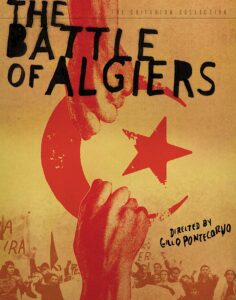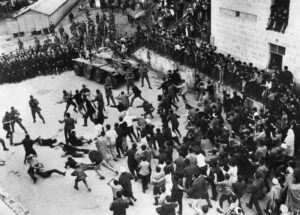What if I were to tell you that a movie, with a budget of only $800,000 made in 1966, was so profound that it significantly influenced revolutionaries throughout the world like Ernesto “Che” Guevara, Fidel Castro, the Black Panthers (as a training manual for violent uprising,) the Provisional Irish Republic Army, and the Jammu Kashmir Liberation Front to such an extent that the 120-minute film was banned in France for five years, that the Israeli government banned the film until 1975 for fear that the emerging Palestine Liberation Organization would use it as an inspiration for attacks on Israelis, but on the other hand, the movie was even screened at the Pentagon by the Directorate for Special Operations and Low-Intensity Conflict in 2003/2004 with respect to the insurgency in Iraq?
Director Gillo Pontecorvo’s The Battle of Algiers is a guidebook for how to build a secret organization (in this case the Algerian independence movement, National Liberation Front, Front de Libération Nationale, FLN) as the most lethal means of striking civilian targets, which often leads to a successful revolution. Pontecorvo greatly details the methods of indoctrination in these groups – techniques that if most Chicago street gangs do not acknowledge where they learned them, they should be sued for plagiarism.
The classic film is based on events that actually took place during the 1954-1962 Algerian struggle for independence from France. The action follows a small group of FLN rebels, and their charismatic leader, Ali La Pointe, who use all means at their disposal to induce the French to leave their country. A petty criminal serving a two-year prison sentence in Algeria in 1954, Ali was recruited in the infamous Barberousse prison (US prisons are also hotbeds for terrorist recruitment) by FLN militants, and became one of the FLN’s most trusted lieutenants in Algiers, the capital of Algeria – until French security forces killed him there on October 8, 1957 in the Casbah.
The FLN, created in March 1954, merged numerous, separate opposing factions of the nationalist movement so as to better wage war against French colonial presence in Algeria. A modern comparison would be if some overarching anarchist group in the U.S. formed and was able to subsequently unify: Antifa, Communist Party USA, Earth Liberation Front, La Raza, Youth Liberation Front, and so forth. Add in American cells of the Palestine Liberation Organization, Hamas, Hezbollah – all anti-American with a bloody history. And what if they also united with basic criminal street gangs, super gangs like Los Zetas, Aryan Brotherhood, and Mara Salvatrucha (MS-13), and elements of Central and South American drug cartels?
You might say, “That couldn’t happen here,” but the FLN started small, initially with just twenty-two members, and an “exterior delegation” in Cairo, Egypt to solicit foreign support, including funding (there were George Soros’ back then too.) They divided Algeria into five zones and placed a colonel in charge of each. Their primary mission was to provide “ideological awareness” backed by violence, so for each Algerian killed by the security forces, a French citizen would be killed by the FLN. The FLN organized as a cell-based pyramid structure, so a member only knew a maximum number of three other insurgents. Thus, if an insurgent were captured and tortured, he could only give up a few fellow terrorists. You’ll also see in the movie that the FLN followed the motto of “snitches get stitches.”
Through the use of terror, the FLN was able to persuade regular, non-violent Algerians, that not only were they NOT French, but that France had to renege on its core values. Sound familiar? Today’s anti-American anarchists stress hyphenated-Americans instead of American unity. They spit on American core values such as the Constitution and Bill of Rights, and trample American history at every turn – attempting to stifle freedom of speech that defends American values. Disagree with the mob and Facebook, Twitter or other social-disease media platforms ban you. The Naródnyy komissariát vnútrennikh del never had it so good.
The novel, The Centurions, written in 1960 by Jean Larteguy, presents much of the same subject. The story, centering on some French Legionnaires, begins with the fall of the French fortress Dien Bien Phu in Vietnam, and subsequently leads to Algeria. It’s central theme is: how is war waged in a new global order, when the “age of heroics is over.” I first read this book at West Point for a Revolutionary Warfare elective, and if you like to curl up with a good read, here’s one.
You can get both the movie and the book online. Organize a Watch Party! You can – and should – see this movie because America’s enemies, both foreign and domestic, almost certainly already have.

